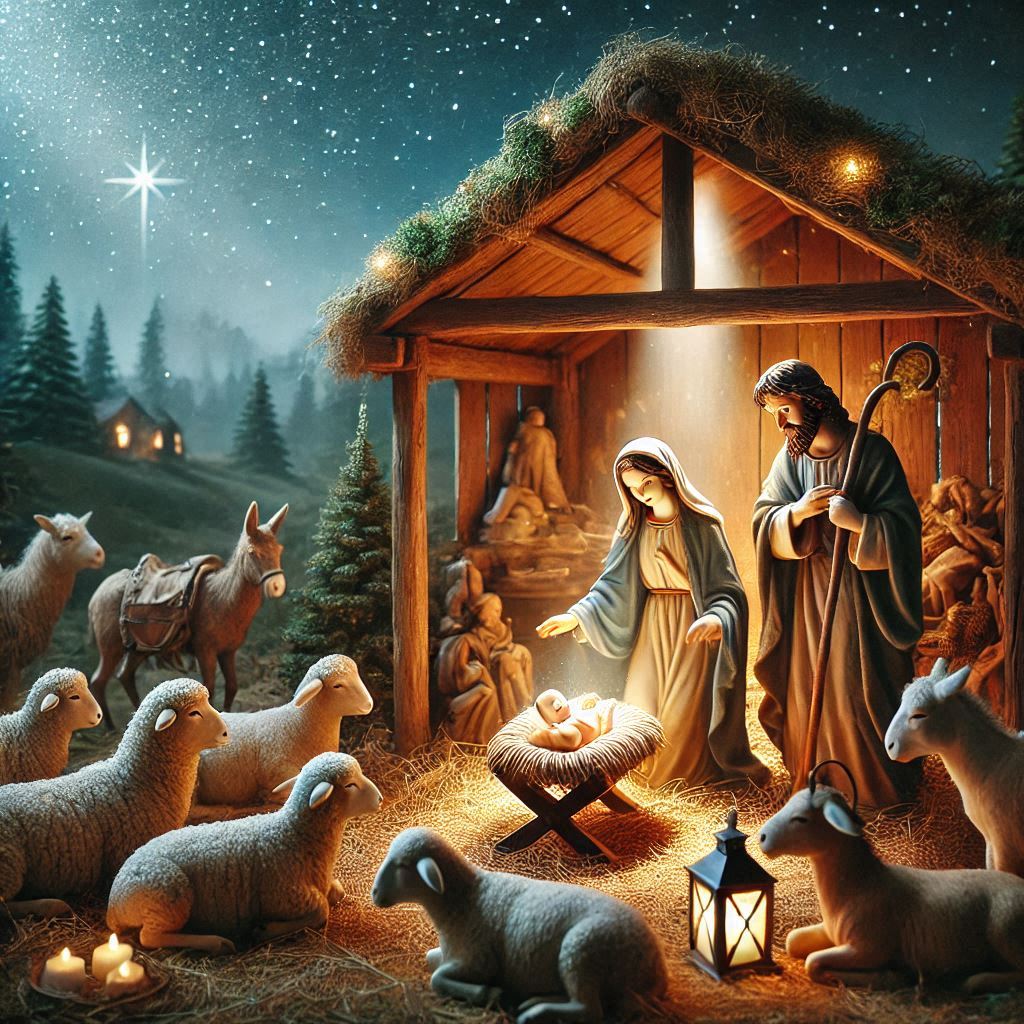Matthew 1:18–2:12
There is no shortage of arguments against Christmas–the celebration of the birth of Jesus Christ. The constant charge: It is a pagan festival. However, that assertion has long been refuted. “It’s commonly thought Christians took over the pagan holiday of Sol Invictus (“Unconquered Sun”), which was on December 25. But there’s little evidence to back this up.”1
Now, the most crucial reason for Christians to celebrate Christmas is the birth of Christ. It is an actual historical event. Jesus Christ is a real historical figure. He was announced and anticipated in the Old Testament. He arrived in the New Testament. Granted, the pagan assertions are correct (and they are not), but the celebration of Christmas is still about Jesus Christ. Despite the commercialisation and secularisation of the season, Jesus is still the centre of it. Answering critics of Christmas, Donald Macleod, in his book ‘From Glory To Golgotha’, gave us a reason to celebrate the birth of Christ and raised a complaint about Christians not taking advantage of the season:
“It would be easy to be critical. Yet, in a day of small things, the festive season so-called, has one advantage: it reminds the public of at least the name and the fact of Jesus Christ. The pity is that men seldom go beyond that and that the church itself appears content to leave the supreme mystery of its faith only vaguely hinted at in the glitter and gaiety of what it calls its greatest festival. Christmas is a lost opportunity, a time when the world invites the Church to speak and she blushes, smiles and mutters a few banalities with which the world is already perfectly familiar from its own stock of cliches and nursery rhymes.”2
His Announcement
In our everyday life, we don’t just show up in people’s homes to visit. There is always a prior arrangement. Apart from people being unprepared, and perhaps you may not receive the hospitality due to you, you may not meet them at home, and you will have travelled in vain.
The Lord Jesus Christ didn’t just show up in the world. He was not an unannounced guest or visitor. Long before his birth, word had gone ahead of him announcing his coming into the world. In Genesis 3:15, when God pronounced judgment after Adam and Eve had disobeyed him, theologians indicate the first gospel—Protoevangelium was preached: “I will put enmity between you and the woman and between your offspring and her offspring; he shall bruise your head, and you shall bruise his heel (Genesis 3:15 ESV). Biblical scholarship indicates the offspring of the woman can be used in the singular to refer to an individual or collectively to the people of God (Gen12:7,22:17-18, Gal 3:16). 3 In it’s singular usage, the ‘offspring of the woman’ points to Jesus. For it is in Christ that Satan was defeated. When Paul addressed the offspring promised Abraham (Genesis 22:18), he pointed out that offspring referred to Christ: “Now the promises were made to Abraham and to his offspring. It does not say, “And to offsprings,” referring to many, but referring to one, “And to your offspring,” who is Christ. (Galatians 3:16). In Genesis 3:15 then, we see the person and ministry of Christ announced.
The curse on the serpent in Genesis 3:14–15 sets the stage for the subsequent course of redemptive history. Obvious New Testament allusions to this passage occur in places such as Luke 10:19, Romans 16:20, and Revelation 12:17. Yet from this point in the book of Genesis, the theme of “enmity between offspring/seed” characterises the biblical narrative. This passage is ultimately fulfilled in Jesus Christ, the consummate “seed of the woman” who crushes the head of the serpent.4
The Birth of Christ was unique. Certainly, he wasn’t the only one born on that day. But his birth was unlike theirs. His birth was miraculous (vv. 18-20). Notice how Matthew is careful to tell us of the uniqueness of Jesus’ birth: “before they came together [that is before the marriage was [consumated] she was found to be with child from the Holy Spirit.” This is the Christian doctrine of the virgin conception of Jesus. The second line of the Apostles Creed captures this clearly:
I believe in Jesus Christ, his only Son, our Lord.
He was conceived by the power of the Holy Spirit and born of the Virgin Mary
This is a foundational doctrine of the Christian faith. We believe in Jesus Christ, who was born of the virgin Mary, for the salvation of sinners. As verse 21 says, he was born, ‘to save his people from their sins’. This is the message of Christmas. That God took upon himself human flesh to deal with our sin problem, and before his birth, the Scriptures announced it. Observe how Matthew says the birth of Christ fulfilled Scripture in vv.22-23. Matthew here quotes Isaiah 7:14: “Therefore the Lord himself will give you a sign. Behold, the virgin shall conceive and bear a son, and shall call his name Immanuel”. Many centuries before his birth, he was spoken of. In the first three chapters of Matthew, we see Matthew constantly pointing to the birth of Jesus as the fulfilment of prophecy (vv. 1:23; 2:3-6;2:13-15; 2:16-18; 2:23). All these from various places in the Old Testament are all considered as referring to the birth of Christ and events surrounding it.
Christmas is the fulfillment of the promise of the son of God, who was announced to come and deal with the problem of sin.
Hail the heav’nly Prince of Peace!
Hail the Sun of Righteousness!
Light and life to all He brings,
Ris’n with healing in His wings.
Mild He lays His glory by,
Born that man no more may die;
Born to raise the sons of earth,
Born to give them second birth
~Hark The Herald Angels Sing, Charles Wesley & George Whitefield
God is faithful to his word. Every promise of God in his word will be fulfilled. No word of God will be left unattended to. This has great encouragement for those of us who have come to faith in Christ. Our life is a part of God’s Redemptive History, and as Paul tells us in Romans 8:28, “We know that for those who love God, all things work together for good, for those who are called according to his purpose.”
His Anticipation
Serving as a bi-vocational Pastor, I have felt exhausted these past weeks. Because the year is ending, my brain is anticipating rest. I look forward to the Christmas break, when I will get some rest, hopefully. Anticipation is a part of life. We all have things we look forward to. In Genesis Chapter 4, right after the promise of an offspring of the woman who will deal a blow to the serpent, a sense of anticipation sets in for Eve. If we pay careful attention to the narrative, we will see the anticipation of the offspring of the woman, more particularly in the birth of Cain and Seth.
Now Adam knew Eve his wife, and she conceived and bore Cain, saying, “I have gotten a man with the help of the Lord” (Genesis 4:1) And Adam knew his wife again, and she bore a son and called his name Seth, for she said, “God has appointed for me another offspring instead of Abel, for Cain killed him (Genesis 4:25)
The anticipation for the fulfilment of the promise of the offspring kicked in when Cain was born. Perhaps Eve thought this was the moment. But her hope will soon fly away. Then again, another child was born. In the same spirit of anticipation, she exclaimed. “God has appointed for me another offspring.” Anticipation for the birth of this offspring runs through the whole Scripture. The apostle Peter aptly tells us of this anticipation
Concerning this salvation, the prophets who prophesied about the grace that was to be yours searched and inquired carefully, 11 inquiring what person or time[a] the Spirit of Christ in them was indicating when he predicted the sufferings of Christ and the subsequent glories. It was revealed to them that they were serving not themselves but you, in the things that have now been announced to you through those who preached the good news to you by the Holy Spirit sent from heaven, things into which angels long to look (1Peter 1:10-12).
His Arrival
Jesus Christ was Announced. He was Anticipated. And he arrived on Christmas. Look at the latter part of Matthew 1:23: “which means God with us”. In Jesus’ birth, God condescended to live among his people bodily. Throughout the Old Testament, God has lived among his people in various symbols and manifested himself in different ways. We can speak about the Ark in the Tabernacle, for example. We can talk about the pillar of cloud and the pillar of fire. But never in the history of humanity has God come to dwell among his people bodily but in the birth of Christ.
This is the most significant event in human history: that God will take upon himself human flesh. This is what is called in theology the incarnation. God becoming flesh. But why was this necessary? It was necessary because God, in his love and mercy, provided a way by which sinful humanity would be reconciled to him. Christmas is God’s love displayed towards sinful humanity. A Gift was given on Christmas—the Gift of God’s Son. God has fulfilled his promise of salvation to reconcile his people unto himself, forgive our sins and save us from eternal destruction. We can be confident that those of us who have come to faith in Christ have joined the family of God. We have been gloriously reconciled to God through faith. And have a hope of eternal life.
And for those who haven’t believed in Jesus, God’s gift of salvation is still available in Christ. He was born so that he would die to pay for the penalty of sin. The penalty is yours to pay. Will you turn to him?
Notes
1 Michael J. Kruger, “Think You Know The Christmas Story? Here Are Five Common Misconception”, https://MichaelKruger.com/think -you-know-the-Christmas-Story-2
2 Donal Macleod, From Glory To Golgotha:Controversial Issues In The Life Of Christ (Christian Focus, 2002)
3 James Hamilton, “The Skull Crushing Seed of The Woman: Inner-Biblical Interpretation of Genesis 3:15”, accessed 3rd March 2020, https://equip.sbts.edu/publications/journals/journal-of-theology/sbjt-102-summer-2006/the-skull-crushing-seed-of-the-woman-inner-biblical-interpretation-of-genesis-315/,
4.R. Andrew Compton, “The Seed of The Woman”, https://tabletalkmagazine.com/article/2018/12/the-seed-of-the-woman/


